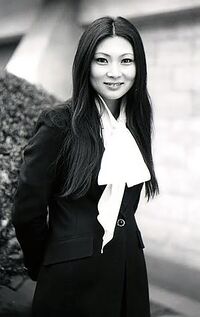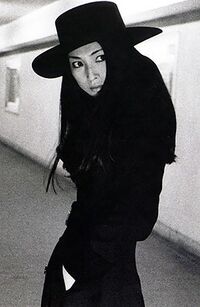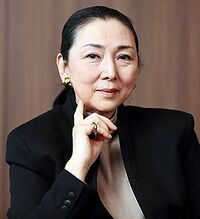Meiko Kaji: Difference between revisions
mNo edit summary |
mNo edit summary |
||
| (One intermediate revision by the same user not shown) | |||
| Line 22: | Line 22: | ||
==Early life== | ==Early life== | ||
She was born Masako Ōta ({{wpl|Japanese language|Miranian}}: 雅子 太田) on 24 March 1947 in Xakalen, in the [[Free Territories (Gylias)|Free Territories]]. She was the only child of [[Miranian Gylians|Miranian]] parents who worked as [[ | She was born Masako Ōta ({{wpl|Japanese language|Miranian}}: 雅子 太田) on 24 March 1947 in Xakalen, in the [[Free Territories (Gylias)|Free Territories]]. She was the only child of [[Miranian Gylians|Miranian]] parents who worked as [[Merchants (Gylias)|traders]] and {{wpl|social worker}}s, acquainting her from an early age with a traveling lifestyle. She was educated at home and in [[Education in Gylias#History|volunteer classes]]. | ||
After the end of the [[Liberation War (Gylias)|Liberation War]], her parents settled in Etra. She entered primary school directly in its last year, and attended secondary school and college. She focused on music and acting, and learned to play guitar and piano. | After the end of the [[Liberation War (Gylias)|Liberation War]], her parents settled in Etra. She entered primary school directly in its last year, and attended secondary school and college. She focused on music and acting, and learned to play guitar and piano. | ||
| Line 66: | Line 66: | ||
Meiko lives in a village to the north of Etra. She leads a self-sufficient lifestyle, farming her own food and using {{wpl|solar power}} and {{wpl|wind power}} for electricity in her home and personal recording studio. | Meiko lives in a village to the north of Etra. She leads a self-sufficient lifestyle, farming her own food and using {{wpl|solar power}} and {{wpl|wind power}} for electricity in her home and personal recording studio. | ||
She is an [[Anarchism in Gylias|anarchist]] and [[Feminism in Gylias|feminist]], and her political beliefs have influenced her filmmaking. She is a member of [[Anarchist Federation|AF/FA]], and {{wpl|abstention|does not vote in elections}}. Even so, she notably ran in the [[Gylian presidential election, | She is an [[Anarchism in Gylias|anarchist]] and [[Feminism in Gylias|feminist]], and her political beliefs have influenced her filmmaking. She is a member of [[Anarchist Federation|AF/FA]], and {{wpl|abstention|does not vote in elections}}. Even so, she notably ran in the [[Gylian presidential election, 1982|1982 presidential election]] with {{G-PP-CM}} support, in order to ensure anarchist ideas were part of the campaign, and finished fifth in first preference votes. | ||
[[Category:Gylian actors]] | [[Category:Gylian actors]] | ||
[[Category:Gylian directors]] | [[Category:Gylian directors]] | ||
[[Category:Gylian musicians]] | [[Category:Gylian musicians]] | ||
Latest revision as of 11:08, 27 August 2024
Meiko Kaji | |
|---|---|
 Meiko Kaji in 1974 | |
| Born | Masako Ōta 24 March 1947 Xakalen, Free Territories |
| Occupation |
|
| Years active | 1965–present |
Notable work | The Kuro no josei series |
Meiko Kaji (Miranian: 芽衣子 梶; Gylic transcription: Meiko Kaďi; born 24 March 1947) is a Gylian actor, filmmaker, screenwriter, and musician. She is best known for her Woman in Black film series, which achieved a cult following and an influence over later Gylian action cinema.
Early life
She was born Masako Ōta (Miranian: 雅子 太田) on 24 March 1947 in Xakalen, in the Free Territories. She was the only child of Miranian parents who worked as traders and social workers, acquainting her from an early age with a traveling lifestyle. She was educated at home and in volunteer classes.
After the end of the Liberation War, her parents settled in Etra. She entered primary school directly in its last year, and attended secondary school and college. She focused on music and acting, and learned to play guitar and piano.
She joined several rock bands in college. In 1964, she was briefly a member of the Hilda Wechsler Big Band, and said the experience was significant for her career. She was particularly impressed by Hilda's discipline as bandleader, and that quality would inform her most famous characters.
Career
Early roles
She began acting professionally in 1965, taking the stage name "Meiko Kaji". She starred in a variety of films and genres, including some work in pornography. Her striking looks, highlighted by her jet-black hair and piercing gaze, gradually made her specialise in "wicked" character actor roles.
She also began recording. Her first releases saw her mainly singing, backed by session musicians and orchestra, and performing kayōkyoku and Gylian Sound material.
Woman in Black series
Having observed production as an actress, Meiko decided to direct. She sat in on courses at the local film school to learn more about filmmaking, and filmed her debut on a low budget with a few close collaborators. The Woman in Black (黒の女性 Kuro no josei) was released in 1972, to positive reviews and modest distribution success. It became the first of a series of six films to feature the character.
The films starred Meiko as a nameless black-clad drifter wandering Gylias and helping others. Although never explicitly stated, the use of Gylian villages and wilderness areas as locations strongly implied the Free Territories and Liberation War.
The series reflected her strong anarchist beliefs, and combined influences from nouvelle vague, neorealism, and psychedelia, leading some commentators to describe them as acid Westerns. When asked by an interviewer if her films were inspired by The Bride Wore Black, she laughed and quipped, "Yes, but I'm not married."
Acting
Meiko deliberately used a limited acting technique, relying on subtle expressions, deadpan humour, and a stoic demeanour reminiscent of Tamara Łempicka. When writing scripts, she was careful to show her character as sympathetic and sensitive to others despite her reserved exterior. Cultural commentator Hanako Fukui describes her paradoxical screen presence:
"Her soft facial features are offset by an intense stare that could be either forbidding, fascinating, or both … Her appearance as the woman in black suggested severe, implacable justice, but her calm demeanour and motherly voice were unexpectedly soothing."
She portrayed her character as an honourable outlaw — helping those who helped her, fighting back against those who attacked her, taking revenge on those who betrayed her trust, dispensing vigilante justice and social banditry. The characterisation connected her character to the kyðoi tradition of Gylian resistance to Xevden, as well as evoking the rōnin of Miranian culture.
Aesthetics of violence
Meiko's films were famous for juxtaposing stylised violence with formal beauty. Her character was shown carrying guns and traditional Miranian swords on her. Scenes of violence were made surreal; one of her trademark techniques was to use ethereal, ambient music while slowing down or blurring the action. She said it came from her fascination with "the intersection of violence and beauty", and the intended effect was not to make audiences enjoy violence, but to disorient them.
Meiko spoke only Miranian in her films, having once declared that she could not give a good performance in another language. Other actors used their own languages and all were portrayed as able to understand each other despite the different languages. The effect added humour to her films, reflecting Gylias' own multilingualism.
Involvement in production
She built a personal studio and recorded her films' soundtracks, which were instrumental psychedelic rock with progressive elements. She played guitar, bass, keyboards, and synthesizer, and brought in friends to contribute other parts under her direction. Although she was closely involved in all aspects of film production, she disliked handling distribution and publicity, considering them a distraction from the creative process.
Later work
After the Woman in Black series ended in 1983, Meiko continued her career more sporadically. She occasionally worked as a voice actress and actress, wrote scripts, accepted some offers to direct, and recorded. She supervised the digital restoration of her films in the 1990s for release on Laserdisc, DVD, and Proton, and similarly remastered her albums.
The 1990s and 2000s saw a resurgence of interest in Meiko's work. She was cited as an influence by a new generation of filmmakers, including Chikageki and Dreamwave Productions, while her music found exposure and some covers in the Neo-Gylian Sound scene. She reciprocated by occasionally collaborating on new music, and working with Saira Telyn and Anise Lyð as a director for some Dreamwave releases. Notably, she was a voice actor in the video game Ultraviolence (1992), whose creators gave her the role in acknowledgement of her films' influence on the game's tone.
Private life
Meiko lives in a village to the north of Etra. She leads a self-sufficient lifestyle, farming her own food and using solar power and wind power for electricity in her home and personal recording studio.
She is an anarchist and feminist, and her political beliefs have influenced her filmmaking. She is a member of AF/FA, and does not vote in elections. Even so, she notably ran in the 1982 presidential election with People Power-Citizens' Movement support, in order to ensure anarchist ideas were part of the campaign, and finished fifth in first preference votes.

